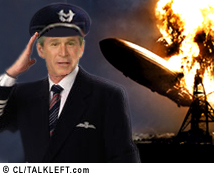Home / War In Iraq
Iraq has carried through with its plans to hang Saddam Hussein's half-brother as well as the former head of the Revolutionary Court. Both were hanged before dawn today.
I wonder how long it will take for the hanging video to hit the internet.
(7 comments) Permalink :: Comments

President Bush will be on 60 Minutes tonight, admitting that his strategy in Iraq has led to increased instability.
Anyone watch? Any observations?
Update: Some highlights (or lowlights, depending on your perspectvie:)
- He watched part of the video of Saddam's hanging but not the part with him going through the trap door. Iraq could have handled the execution a lot better
- He knows he's unpopular right now but it doesn't bother him
- Using language like "Bring 'em on" was a mistake. The troop levels could have been a mistake. He's proud of our efforts, we liberated that country, Iraq should show more gratitude.
(68 comments, 234 words in story) There's More :: Permalink :: Comments
CNN has released a new poll showing that 2/3 of Americans oppose President Bush's plan for a troop escalation in Iraq. It's the first poll since President Bush's speech Wednesday night.
Two out of three Americans oppose President Bush's plan to send more troops to Iraq, a CNN/Opinion Research Corp. poll released Friday indicates. Nearly two-thirds of those polled also say Bush has no clear plan for Iraq.
....Asked whether they believe additional troops will help the United States achieve its goals, 48 percent who answered the poll said it will make no difference; 31 percent said it would help, and 18 percent said the United States would be less likely to accomplish its goals in Iraq.
(10 comments) Permalink :: Comments

Here are some excerpts from Bush's speech tonight.
[Update: Text of speech is here.]Several Republicans are balking at the plan:
A number of Republican senators -- including Sen. Gordon Smith of Oregon, Sen. Norm Coleman of Minnesota, Sen. Chuck Hagel of Nebraska, Sen. Olympia Snow of Maine and Sen. Sam Brownback of Kansas -- have publicly questioned whether Bush's plan to increase troop strength will help stabilize Iraq.
"A troop surge in Baghdad would put more American troops at risk to address a problem that is not a military problem," Coleman said Wednesday on the Senate floor.
"It would put more American soldiers in the cross hairs of sectarian violence and create more targets. I just don't believe this makes sense," Coleman said.
Democrats are upset, among other things, at Bush's lack of consultation with them over the plan. By the time he met with them, the plan was a fait accompli.
(100 comments, 337 words in story) There's More :: Permalink :: Comments
President Bush hasn't even given his speech yet, but the first new surge of troops is already en route to Baghdad and more are scheduled to leave tomorrow:
Ninety advance troops from the 82nd Airborne Division arrived in Baghdad today. An additional battalion of roughly 100 troops from the same division are expected to arrive in Baghdad Thursday.
There will also be more call-ups from the National Guard.
What's different about this troop surge? According to military commanders, the troops will be residing in local Iraqi neighborhoods:
(17 comments, 384 words in story) There's More :: Permalink :: Comments
Two of the most publicized atrocities by U.S. soldiers in the War in Iraq have been Haditha and Mahmoudiya.
Today, the Associated Press reports that its own investigation into Mahmoudiya revealed the U.S. was aware PFC Steven Green, who allegedly raped a teenage Iraqi girl and killed her and her family, was known to have homicidal tendencies and a desire to strike out and kill Iraqis three months before the tragic event.
(17 comments, 335 words in story) There's More :: Permalink :: Comments
To answer my own question - Yes. But not in the way that is being discussed today by Senator Kennedy:
Be it enacted by the Senate and House of Representatives of the United States of America in Congress assembled,Section 1. Prohibition on use of funds for escalation of United States forces in Iraq.
Notwithstanding any other provision of law, no Federal funds may be obligated or expended by the United States Government to increase the number of United States forces in Iraq above the level for such forces which existed as of January 1, 2007, without a specific authorization of Congress by law for such an increase.
Of course, as a practical matter, the President can and will veto any such legislation. But even if such a veto could be overridden, the law would be an unconstitutional violation of the separation of powers, impinging on the President's power as Commander in Chief in Wartime. In order to act in the manner Senator Kennedy wishes, the Congress must strip the President of the power the Congress granted him to wage war in Iraq. To wit, the Congress needs to "undeclare" the Iraq Debacle by repealing the Iraq War resolution. A new resolution can be approved authorizing the use of force in Iraq for a purpose the Congress wishes, but I believe Senator Kennedy is wrong when he says:
In October 2002, Members of Congress authorized a war against the regime of Saddam Hussein, not to send our troops into a civil war. I voted against that resolution and feel an escalation of this war only compounds the original mistake of going in the first place.
Congress authorization was broader than this:
SEC. 3. AUTHORIZATION FOR USE OF UNITED STATES ARMED FORCES.(a) AUTHORIZATION. The President is authorized to use the Armed Forces of the United States as he determines to be necessary and appropriate in order to
(1) defend the national security of the United States against the continuing threat posed by Iraq; and
(2) enforce all relevant United Nations Security Council Resolutions regarding Iraq.
This blanket grant of war power to the President was a disgrace. But it was done. And now it must be undone. More.
(17 comments, 1062 words in story) There's More :: Permalink :: Comments
Update: The latest Gallup/USA Today poll shows 61% of Americans oppose increased troop levels. Democrats, meanwhile, consider their options to the President's proposed plan to increase troop levels.
******Wednesday night, President Bush will address the nation with details of his new plan for Iraq. The plan calls for sending more troops to Iraq.
Think Progress is tracking congressional response to a plan that adds more troops.
....only seven lawmakers have given their public support to Bush’s escalation plan, twenty-three have come out in opposition, and fifteen have said they will withhold judgement for now.
Arianna has a scathing commentary on the plan.
When it comes to the White House's latest "new approach" to Iraq, we are definitely entering "the lunatics have taken over the asylum" territory.
....It's one thing to believe you're Napoleon. It's quite another to send more young people to die in your Waterloo.
(42 comments, 504 words in story) There's More :: Permalink :: Comments
More video of Saddam Hussein's hanging are making the rounds.
Here's the latest, showing him dead with his neck ripped open and exposed.
Mypetjawa has the full video, as obtained from a Shia website and put on Google.
(2 comments) Permalink :: Comments
I've never liked the argument that Bush and Cheney went to Iraq for the oil profits. But stories like this make me look pretty naive:
Iraq's massive oil reserves, the third-largest in the world, are about to be thrown open for large-scale exploitation by Western oil companies under a controversial law which is expected to come before the Iraqi parliament within days.. . . The huge potential prizes for Western firms will give ammunition to critics who say the Iraq war was fought for oil. They point to statements such as one from Vice-President Dick Cheney, who said in 1999, while he was still chief executive of the oil services company Halliburton, that the world would need an additional 50 million barrels of oil a day by 2010. "So where is the oil going to come from?... The Middle East, with two-thirds of the world's oil and the lowest cost, is still where the prize ultimately lies," he said.
Oil industry executives and analysts say the law, which would permit Western companies to pocket up to three-quarters of profits in the early years, is the only way to get Iraq's oil industry back on its feet after years of sanctions, war and loss of expertise. . . .
Meanwhile, as David Kurtz points out, if you do not play ball, the US works against oil exploration:
in Iran, "a new U.S. campaign to dry up financing for oil and natural gas development poses a threat to the republic's ability to continue exporting oil over the next two decades," reports the LA Times
(88 comments) Permalink :: Comments

New documents have been released in the Haditha killings of 24 Iraqis by U.S. Marines. They are chilling.
In a nutshell: After the roadside bombing in which a marine was killed, a white taxi with five unarmed civilians happened to drive by the scene.
Staff Sgt. Frank D. Wuterich, the squad's leader, shot the men one by one after Marines ordered them out of a white taxi in the moments following the explosion, which killed one Marine and injured two others, witnesses told investigators. Another Marine fired rounds into their bodies as they lay on the ground.
(66 comments, 485 words in story) There's More :: Permalink :: Comments
Writing in the Independent, Ali Allawi, former Iraqi Defence Minister provides a blueprint for peace in Iraq.
It's a five part plan, the components of which he lists at the end.
The result of his plan, he writes, would be "three interlinked outcomes":
The first would be a decentralised Iraqi state with new regional governing authorities with wide powers and resources. Devolution of power must be fair, well planned, and executed with equitable revenue-distribution. Federal institutions would have to act as adjudicators between regions. Security must be decentralised until such time as confidence between the communities is re-established.
The second essential outcome would be a treaty that would establish a confederation or constellation of states of the Middle East, initially including Iraq, Syria, Lebanon, and Jordan. The main aim of the confederation would be to establish a number of conventions and supra-regional bodies that would have the effect of acting as guarantors of civil, minority and community rights.
Independent reporter Patrick Cockburn says of the plan:
(10 comments, 263 words in story) There's More :: Permalink :: Comments
| << Previous 12 | Next 12 >> |







